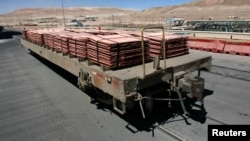Immigrants from around South America hoping to seek their fortunes in the continent's copper mining capital of Antofagasta, Chile, are instead finding poverty, exclusion and a precarious home in the city's growing temporary slums.
Chile, one of Latin America's most developed countries, has become a magnet in recent years for immigrants from poorer and less stable parts of the region, especially Haiti, Venezuela, Bolivia, Peru, Colombia and Ecuador.
Many are attracted to this northern Chile city, close to where the majority of mines are located in the world's biggest copper exporter. Not all seek work in the mines themselves, but rather in providing the ancillary services that mushroomed during the previous decade's commodity boom.
But the end of that boom and a sharply lower copper price have hit investment and jobs, which has been felt particularly sharply in Chile's northern provinces. While most of the country has maintained weak economic growth thanks to other industries like agriculture, Antofagasta has been plunged into recession.
Migrants to Chile on average have a higher level of education than Chileans, according to U.N. data. But anti-immigrant sentiment — increasingly exploited by politicians — means they are more likely to be left without work.
Reality is different
"The idea was to move up and progress," said Angela Maria Concha, 36, a photographer who arrived in Antofagasta from Colombia three years ago.
"When we got here, we found reality was different," she said. "It's not the way it's pictured there [in Colombia]. ... Before there were not so many immigrants. Now there are a lot."
Ecuadorean Yoana Paredes, 34, who arrived in 2009 hoping to study and work, said: "We are good people, working people, and we always end up stigmatized for being foreigners, and [they think] we all come to commit crime."
Paredes lives in the "Ecuachilep campamento," where temporary homes built from sheets of plywood and metal have sprung up in the dry desert dust, housing mainly immigrants from Andean countries.
Such camps now dot the city's outskirts, said Antofagasta Mayor Karen Rojo.
"In today's conditions, with the economic crisis our country is going through, the copper price fall, the Antofagasta labor market is not able to absorb all the immigrants who come today looking to improve their life chances," she said.





